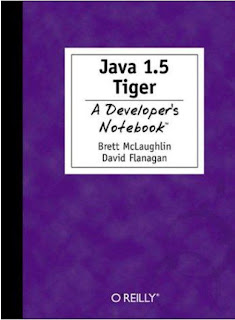Java 1.5 Tiger: A Developer's Notebook
Author: David Flanagan & Brett McLaughlin
Published Year: June 2004
Publisher:O'Reilly
ISBN: 0-596-00738-8
Size: 4.6 MB (RAR)
Page: 200 Pages
Java 5.0, code-named "Tiger", promises to be the most significant new version of Java since the introduction of the language. With over a hundred substantial changes to the core language, as well as numerous library and API additions, developers have a variety of new features, facilities, and techniques available.
But with so many changes, where do you start? You could read through the lengthy, often boring language specification; you could wait for the latest 500 page tome on concepts and theory; you could even play around with the new JDK, hoping you figure things out--or you can get straight to work with Java 5.0 Tiger: A Developer's Notebook.
This no-nonsense, down-and-dirty guide by bestselling Java authors Brett McLaughlin and David Flanagan skips all the boring prose and lecture, and jumps right into Tiger. You'll have a handle on the important new features of the language by the end of the first chapter, and be neck-deep in code before you hit the halfway point. Using the task-oriented format of this new series, you'll get complete practical coverage of generics, learn how boxing and unboxing affects your type conversions, understand the power of varargs, learn how to write enumerated types and annotations, master Java's new formatting methods and the for/in loop, and even get a grip on concurrency in the JVM.
Light on theory and long on practical application, Java 5.0 Tiger: A Developer's Notebook allows you to cut to the chase, getting straight to work with Tiger's new features. The new Developer's Notebooks series from O'Reilly covers important new tools for software developers. Emphasizing example over explanation and practice over theory, they focus on learning by doing--you'll get the goods straight from the masters, in an informal and code-intensive style that suits developers. If you've been curious about Tiger, but haven't known where to start, this no-fluff, lab-style guide is the solution.


